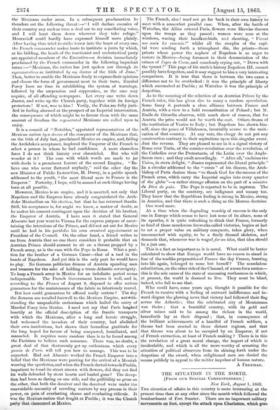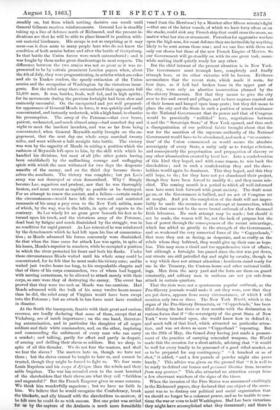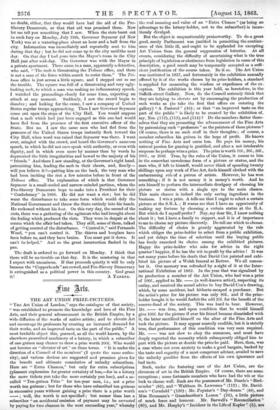THE SITUATION IN THE NORTH.
[FROM OUR SPECIAL CORRESPONDENT.]
New York, August 1, 1863. THE situation of affairs in this country is more interesting at the present time than at any other since the month which followed the bombardment of Fort Sumter. There are no important military movements on foot, except the attack upon Charleston, which goes steadily on, but from which nothing decisive can result until General Gilmore receives reinforcements. General Lee is steadily taking up a line of defence north of Richmond, and the present in- dications are that he will be able to Aare himself in position with- out material hindrance. His escape is not so surprising as it may seem—as it does seem to many people here who do not know the condition of both armies before and after the battle of Gettysburg. In that battle the Union forces were much outnumbered ; and it was fought by them under great disadvantage in most respects. The difference between the two armies was not so great as it was re- presented to be by certain prominent London papers when, about the 4th of July, they were prognosticating, in articles which are cakes and ale to Yankee readers, the speedy extinction of the Union armies and the occupation of Washington by the victorious insur- gents. But the rebel army there outnumbered their opponents full 15,000 men. It was, besides, fresh, well fed, and in high spirits ; for its movements during the previous fortnight had been slow and eminently successful. On the unexpected and yet well prepared- for appearance of General Meade in force, it was quickly and easily concentrated, and instantly undertook, with a high hand, to chastise his presumption. The army of the Potomac—that over brave, patient, undaunted, and much abused army—had marched day and night to meet the insolent invaders, and was so far from being concentrated, when General Reynolds rashly brought on the en- gagement, that the next day one whole corps marched twenty miles, and went without a halt straight into battle. The victory was won by the sagacity of Meade in seizing a position which the rashness of Reynolds left open to him, by the skill with which he handled his divisions, but most of all (the other points having been established) by the unflinching courage and unflagging spirit with which the men withstood for two days the desperate assaults of the enemy, and on the third day became them- selves the assailants. The victory was complete ; but yet Lee's army was not destroyed or even demoralized. Why ? Simply because Lee, sagacious and prudent, saw that he was thoroughly beaten, and must retreat as rapidly as possible or be destroyed. For an attempt to renew the contest, and a failure—certain under the circumstances—would have left the worn-out and scattered remnants of his army a prey even to the New York militia, none of which, by the way, *as in the battle, in spite of reports to the contrary. So Lee wisely let no graze grow beneath his feet as he turned upon his track, and the victorious army of the Potomac, dead beat by fatigue and much diminished by the struggle, was in no condition for rapid pursuit. As Lee retreated he was reinforced by the detachments which he had left upon his line of communica- tion; as Meade advanced his forces conversely were diminished. So that when the time came for attack Lee was again, in spite of his losses, Meade's superior in numbers, while he occupied a position in which the river protected his front and both his flanks. Under these circumstances Meade waited until his whole army could be concentrated, for he felt that he must make his victory sure; and he waited just twelve hours too long, to his unspeakable chagrin and that of three of his corps commanders, two of whom had begged, with moving earnestness, to be allowed to attack merely with their corps, so sure were they of destroying the enemy. The event has proved that they were too rash as Meade was too cautious. Had Meade advanced with the bulk of his army twelve hours sooner than he did, the rebel army of Virginia would have been swept into the Potomac ; but an attack in less force must have resulted in disaster.
At the South the insurgents, frantic with their great and various reverses, are loudly declaring that none of them, except that at Vicksburg, are of much importance ; on the one hand, threaten- ing extermination, and in particular the slaughter of all negro soldiers and their white commanders, and, on the other, imploring and commanding the enlistment of every man who can carry a musket ; and talking, partly for effect and partly in despair, of arming and drilling their slaves as soldiers. But we sleep, in
spite of all this thunder. We do not fear the masters, and shall we fear the slaves ? The masters hate us, though we hate not them ; but the slaves cannot be taught to hate us, and cannot be trusted, though they might be forced to fight us. We fear more Louis Napoleon and his corps d'Afi-ique than the rebels and their sable bugaboo. The war has revealed even to the most besotted of the slaveholders that their slaves are what they call "faithless and ungrateful !" But the French Emperor gives us some concern. We think him wonderfully sagacious ; but we have no faith in him. We believe that he would recognize the Confederacy, break the blockade, and ally himself with the slaveholders to-morrow, if he felt sure he could do so with success. But one point was settled for us by the capture of the Atalanta (a much more formidable
vessel than the Merrimac) by a Monitor after fifteen minute's fight —that one of the latter vessels, of which we have forty afloat or on the stocks, could sink any French ship that could cross the ocean, no matter what her size or armament. Powerless for aggressive warfare upon the high seas, for coast defence they are invincible by anything likely to be sent across those seas ; and we can line with them not only our shores but those of the new French Empire of Mexico. So our Government will go steadily on with its one great task, mean- while making itself quietly ready for any other.
But the chief interest of the present situation is in New York. The Government must triumph here, completely and finally triumph here, or its other victories will be barren. Evidence accumulates that the recent riots, which made it seem, for four days, as if hell had broken loose in the upper part of the city, were only an abortive insurrection planned by the Pro-slavery Democrats. Not that they meant to give the city
over to fire and sword and pillage, and to have negroes roasted out of their houses and hanged upon lamp-posts ; but they did mean to place the city and the State in such a position of armed resistance to the National Government that its power and that of Congress would be practically " nullified " here, negotiations between it and the "Sovereign State" of New York opened, and thus such a disorganization of our political fabric brought about that the war for the assertion of the supreme authority of the National Government would have to be abandoned, and such a "re-construc- tion" of the Union commenced as would secure the absolute sovereignty of every State, a unity only as to foreign relations, and consequently the perpetuation and propagation of slavery or any other abomination created by local law. Into a confederation of this kind they hoped, and with some reason, to win back the slaveholders ; and in such a confederation they and the slave- holders would again be dominant. This they hoped, and this they still hope, to do.; for they have not yet abandoned their project, though they have been forced to modify it ; and they mean mis- chief. The coming month is a period to which all well-informed men here must look forward with great anxiety. The draft must go on, or the Government is bullied, and an act of Congress set at nought. And yet the completion of the draft will not impro- bably be made the occasion of an attempt at insurrection, which will in that case not be the mere brutal outbreak of a few thousand Irish labourers. No such attempt may be made ; but should it not be made, the reason will be, not the lack of purpose but the loss of power through the consequences of the recent miscarriage,. which has added so greatly to the strength of the Government, and so weakened the very numerical force of the "Copperheads," that were they not as daring, as desperate, and as crafty as the rebels whom they befriend, they would give up their case as hope- less. This may seent a timid and too apprehensive view of affairs ; but although a fortnight has passed since the riot was put down, our streets are still patrolled day and night by cavalry, though in a way which does not attract attention ; howitzers stand ready for use in the Treasury, the Custom-house and other national build- ings. Men from the navy yard and the forts are there on guard constantly, and solitary men in uniform are not yet safe from attack in certain quarters.
That the riots were not a spontaneous popular outbreak, as the Pro-Slavery journals would make it out they were, now that they are put down, appears from many circumstances, of which I will mention only two or three. The New York World, which is the organ of the Pro-Slavery Democrats, or "Copperheads," has been filled during the last three or four months with the declaration in various forms that if " the-sovereignty of the great State of New York" were trenched upon, she would know how to defend it ; and much talk of that kind, which attracted no particular atten- tion, and was set down as mere " Copperhead " vapouring. But on the 29th of May, the Grand Jury having just made a present- ment of the practice of carrying concealed weapons, the World made this the occasion for a short article, advising that "it would be well for every family to be possessed of a good rifled musket, so as to be prepared for any contingency." "A hundred or so of shot," it added, "and a few pounds of powder might also prove handy." This advice was given on the ground that "it is well to be ready to defend our homes and personal liberties from invasion from any quarter." This also attracted no attention except from a few observant watchers of the signs of the times.
When the invasion of the Free States was announced exultingly in the Richmond papers, they declared that one object of the move- ment was so to destroy our political and social organization that we should no longer be a coherent power, and so be unable to con- tinue the war or even to hold Washington. Had Lee been victorious they might have accomplished what they threatened ; and there is no doubt, either, that they would have had the aid of the Pro- Slavery Democrats, or that that aid was promised them. Now let me tell you something that I saw. When the riots burst out in such fury on Monday, July 13th, Governor Seymour (of New York) was at a watering-place about an hour and a half from the city. Information was immediately and repeatedly sent to him during that day ; but he did not come up to the city untilthe next day. On that day I had gone into the Mayor's room in the City Hall just after mid-day. The Governor was with the Mayor in a private apartment. There came in a man, apparently a detective, who said, "The mob is threatening the Tribune office, and there is not a man of the force within search to resist them." The Tri- bune office is just across a little square, and I stepped out to see the trouble. The square was full of a threatening and very ugly- looking mob, to which a man was making an inflammatory speech. I watched the proceedings closely for some time, expecting an attack at any moment. Suddenly, I saw the crowd begin to dissolve ; and looking for the cause, I saw a company of United States regular troops approaching. Then I saw Governor Seymour come out upon the steps of the City Hall. You would suppose that a mob which had just been engaged as this one had would have fled from the presence of the first executive officer of the State. But no. I saw the same men who had fled from the presence of the United States troops instantly flock toward the City Hall, when word was raised that Seymour was there. I went over, mingled with the crowd, and heard the Governor's nauseous speech, in which he did not once speak with authority, or even with dignity, and in which even more by manner than by words he deprecated the little irregularities and bowed to the majesty of his "friends.' And there I saw standing, at the Governor's right hand, patronizing him, leading the mob in their cheers, and, finally— will you believe it?—patting him on the back, the very man who had been inciting the riot a few minutes before in front of the Tribune office. The explanation of which is that Governor Seymour is a small-soukd and narrow-minded partizan, whom the Pro-Slavery Democrats hope to make into a President for their "Confederacy" in 1866. He did not want a riot ; but he did want the disturbance to take some form which would defy the National Government and throw the State entirely into his hands. He reckoned without his host. On this very day, the second of the riots, there was a gathering of the agitators who had brought about the feeling which produced the riots. They were in despair it the course which the affair had taken. They still, some of them, talked of getting control of the disturbance. "Control it," said Fernando Wood, "you can't control it. The thieves and burglars have been before us, and they have brains. You must put it down. It can't be helped." And so the great insurrection flashed in the pan.
The draft is ordered to go forward on Monday. I think that there will be no trouble on that day. It is the mustering in that I expect with uneasiness. If that proceeds quietly it will be only because the " Copperheads " are cowed, and Pro-Slavery Democracy is extinguished as a political power in this country. God grant
































 Previous page
Previous page